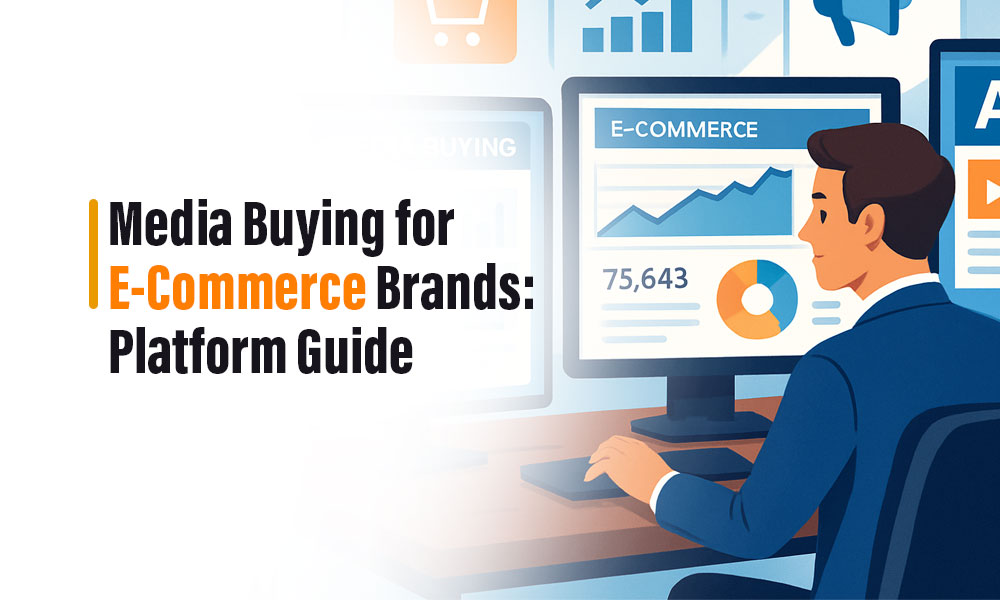Let’s imagine for a moment you’re an e-commerce brand. Maybe you sell ethically sourced yoga mats. Or Bluetooth-enabled coffee mugs. Or neon socks for dogs. Doesn’t matter what you sell; if you’re in e-commerce, one thing is universal:
You need eyeballs! Good, interested, credit-card-ready eyeballs.
And unless you’ve been blessed with a viral TikTok moment or Oprah’s endorsement, those eyeballs don’t come for free. You have to buy them. Carefully. Strategically. Ideally without wasting your entire marketing budget in the first month.
That’s where media buying comes in. But here’s the catch: media buying today isn’t just about throwing money at Facebook ads and hoping for the best. It’s a science, an art, and sometimes a little like trying to win at poker while blindfolded. And for e-commerce brands, choosing the right platforms – and the right partner – can mean the difference between growing fast or watching your ROAS (return on ad spend) cry in a dark corner.
So, let’s break it down: what media buying really is, what platforms you should care about, and why a good media buyer is the MVP your e-commerce business didn’t know it needed.
What is Media Buying, Really?
At its simplest, media buying is the process of purchasing ad space—on websites, apps, social platforms, video networks, you name it—to get your brand in front of the right people at the right time.
But real media buying is more than that. It’s:
- Negotiating ad placements
- Managing budgets across channels
- Targeting the right audience segments
- Timing campaigns strategically
- Measuring and optimizing results like your business depends on it (because it does)
A skilled media buyer doesn’t just get your brand seen—they get your brand remembered. Clicked. Added-to-cart-ed. Purchased.
Why E-Commerce Brands Need Smart Media Buying
If you’re selling anything online, chances are you’re swimming in competition. There are hundreds, maybe thousands, of stores offering something eerily similar to your product, and they’re all fighting for the same attention span.
The right media buying strategy cuts through that noise. It ensures that your beautiful product doesn’t just sit there on a shelf-shaped website—it gets discovered, clicked, and bought.
Whether you’re pushing flash sales, seasonal collections, limited-time bundles, or your first-ever product drop, media buying can:
- Drive immediate traffic to your store
- Build retargeting audiences for future sales
- Support email list growth and lead gen
- Create brand awareness that sticks long after the first click
But only if you’re doing it right.
Platforms That Matter (And What They’re Actually Good For)
Let’s take a look at the media buying platforms every e-commerce brand should know—and what a smart digital media buying agency will help you do on each one.
-
Facebook & Instagram (Meta Ads)
The OGs of e-commerce performance marketing. Still effective. Still misunderstood.
Meta Ads allow highly granular audience targeting and pixel-powered retargeting that can bring users back days, even weeks later. A strong media buyer knows how to build full-funnel strategies here: awareness, consideration, conversion, repeat.
Perfect for:
Product launches
Abandoned cart retargeting
Visual storytelling
Pro tip: Test creatives like your life depends on it. Because it kind of does.
-
Google Ads (Search, Shopping, Display)
The most intent-rich platform around. When someone Googles “best dog bed for senior golden retrievers,” they are not looking for memes – they’re looking to buy.
Google Ads (especially Google Shopping) is a goldmine for high-converting searchers, but it’s also highly competitive and keyword pricing can spiral fast.
That’s why many brands hire online marketing specialists to manage and optimize this channel. It’s a battle of margins, and you want someone who knows how to bid smart and write headlines that actually convert.
Perfect for:
High-intent purchases
Seasonal demand spikes
Brand protection (aka, outbidding your competitors for your own name)
-
TikTok Ads
Ah, TikTok. Home of dance trends, micro-skits, and now… e-commerce gold.
TikTok has become a powerhouse for product discovery, especially for Gen Z and Millennial shoppers. It’s unpredictable, fast-moving, and, honestly, a little chaotic. Which is why creative matters more here than almost anywhere else.
Good TikTok media buying requires fast testing, real-time feedback loops, and a media buyer who isn’t afraid of slightly unhinged UGC (user-generated content).
Perfect for:
New-to-market products
Viral-worthy brands
Storytelling with a face (aka, if your founder isn’t camera shy)
-
YouTube Ads
Second-largest search engine in the world. Immense reach. Great for storytelling and building trust.
YouTube pre-roll ads can drive strong brand recall and support awareness campaigns. But they require serious creative chops—you’re interrupting someone’s cat video, so it better be worth it.
Perfect for:
High-consideration products (think $100+)
Demos and tutorials
Building thought leadership
Pro tip: Skippable doesn’t mean forgettable. Make your first 5 seconds count.
-
Pinterest Ads
This one flies under the radar, but for the right product – home decor, fashion, wellness, DIY – it’s a secret weapon. A wunderwaffen!
Pinterest users are planners. They’re searching for inspiration with purchase intent. If you’ve got beautiful visuals and products with a lifestyle angle, Pinterest can drive incredibly efficient clicks.
Ideal for:
Evergreen products
Visual brands
SEO-meets-shopping plays
-
Programmatic Display & Native
Think banners, native articles, placements across hundreds of websites—all powered by algorithms and cookies. It sounds fancy, but programmatic ads can be a powerful way to scale after you’ve nailed the core platforms.
Best used with a digital media buying agency that has access to the tech, the data, and the experience to make it work. Because otherwise, you’re just buying impressions in the dark.
Use it for:
Retargeting
Awareness at scale
Reaching niche interest groups
Why You Shouldn’t DIY Media Buying (Unless You Love Losing Money)
Here’s the thing: media buying isn’t just about pushing buttons in Facebook Ads Manager.
It’s about understanding attribution models. Running A/B/C/D/E tests. Reading analytics dashboards like sacred scrolls. Pacing spend mid-campaign. Monitoring frequency caps. Testing landing pages. And doing all this without burning your monthly budget in the first 48 hours.
That’s why smart brands turn to a digital media buying agency or seasoned media buyer. You get:
- Strategy rooted in data, not guesswork
- Creative recommendations that actually reflect what’s working now
- Campaigns optimized daily (not “when someone has time”)
- Transparency and reporting that doesn’t sound like witchcraft
It’s the difference between gambling and investing.
What to Look for in a Media Buyer or Agency

If you’re ready to get serious about media buying, here’s what your partner should bring to the table:
- Platform-specific expertise (not just “we run ads”)
- Real case studies and ROAS results
- Understanding of e-commerce metrics (LTV, CAC, AOV, etc.)
- Willingness to test and pivot quickly
- Clear communication and regular reporting
Whether you hire online marketing specialist freelancers or go with a full agency, make sure they’re obsessed with your numbers—because that’s how growth actually happens.
People also ask
-
What does a media buyer actually do for an e-commerce brand?
A media buyer plans, negotiates, and executes ad placements across digital platforms to help your brand reach its ideal audience.
For e-commerce brands, a skilled media buyer ensures every ad dollar works harder -targeting high-intent users, optimizing campaigns, and maximizing return on ad spend (ROAS). They analyze audience behavior, run A/B tests, and constantly refine campaigns to drive conversions. If you’re looking to scale, partnering with a professional or a digital media buying agency can make a world of difference in how effectively you reach—and convert—shoppers online.
-
Why should I hire a digital media buying agency instead of doing it myself?
While self-managed ad campaigns may work at a small scale, they can quickly become overwhelming and inefficient as you grow.
A digital media buying agency brings specialized expertise, cross-platform strategies, and access to tools that optimize campaigns at every level. They understand platform nuances, stay ahead of trends, and ensure your budget is used wisely. Whether you’re new to paid media or spending five figures a month, working with professionals allows you to focus on your core business while experts manage your acquisition engine.
-
What platforms should a media buyer focus on for e-commerce?
A great media buyer for e-commerce should be skilled across platforms like Meta (Facebook & Instagram), Google Ads, TikTok, YouTube, and Pinterest. Each platform offers unique benefits – from intent-rich search traffic on Google to storytelling and brand engagement on TikTok. The right platform mix depends on your product, target audience, and campaign goals. A digital media buying agency can help identify which platforms are best suited to your brand and build custom strategies that deliver results while keeping acquisition costs in check.
-
How do I know if I need to hire an online marketing specialist?
If you’re spending hours trying to understand ad dashboards, struggling with targeting, or not seeing a return on your ad spend, it’s time to hire online marketing specialist support. These experts bring data-driven insight to your campaigns, helping you make smarter budget decisions and avoid common pitfalls. Whether through a freelance media buyer or an agency, having someone who understands strategy, creative testing, and performance optimization will ultimately save time and improve profitability for your e-commerce business.
-
Can media buying help with both brand awareness and direct sales?
Absolutely. A skilled media buyer understands how to design campaigns that serve both upper-funnel (brand awareness) and lower-funnel (direct conversions) objectives.
Platforms like YouTube and TikTok are great for awareness, while Google Shopping and Meta Ads excel at closing the deal. Working with a digital media buying agency ensures your campaigns are strategically layered, driving sales while building long-term brand equity. Whether you’re launching a new product or scaling a proven one, the right approach will deliver short-term results and long-term growth.
-
Is it better to hire a freelancer or a full agency for media buying?
It depends on your budget, goals, and in-house capabilities. A freelance media buyer can be a great fit for lean teams needing flexible support, while a full digital media buying agency provides broader resources, including creative, analytics, and strategy experts.
If you’re scaling aggressively, or running multiple product lines and channels, an agency offers better infrastructure. In both cases, it’s wise to hire online marketing specialist professionals with proven experience in e-commerce media buying who understand your KPIs and can grow with you.
Final Thoughts: Buy Smarter, Not Louder
E-commerce is a battlefield. Products don’t just sell because they’re great—they sell because people see them. Remember them. Trust them.
Media buying is your way in. Your foot in the digital door. But like anything involving money and algorithms, it pays (literally) to do it right.
So whether you’re scaling a seven-figure Shopify store or launching your very first product, make media buying a priority. Choose platforms with purpose. Let data guide you. And when in doubt?
Find a media buyer who’s done it before – and knows how to make every click count.



